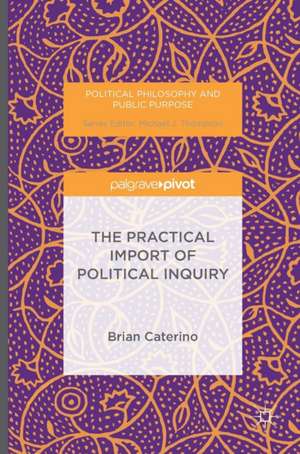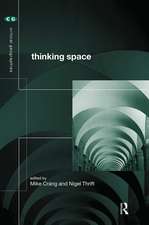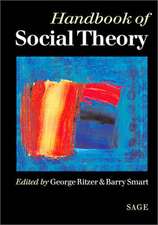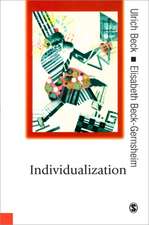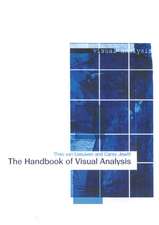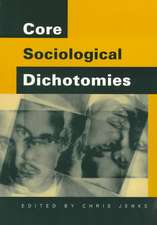The Practical Import of Political Inquiry: Political Philosophy and Public Purpose
Autor Brian Caterinoen Limba Engleză Hardback – 27 iun 2016
| Toate formatele și edițiile | Preț | Express |
|---|---|---|
| Paperback (1) | 377.57 lei 43-57 zile | |
| Springer International Publishing – 31 mai 2018 | 377.57 lei 43-57 zile | |
| Hardback (1) | 383.50 lei 43-57 zile | |
| Springer International Publishing – 27 iun 2016 | 383.50 lei 43-57 zile |
Din seria Political Philosophy and Public Purpose
- 20%
 Preț: 689.87 lei
Preț: 689.87 lei - 15%
 Preț: 711.56 lei
Preț: 711.56 lei -
 Preț: 387.75 lei
Preț: 387.75 lei -
 Preț: 381.98 lei
Preț: 381.98 lei - 15%
 Preț: 642.36 lei
Preț: 642.36 lei - 15%
 Preț: 640.06 lei
Preț: 640.06 lei - 18%
 Preț: 1408.40 lei
Preț: 1408.40 lei - 18%
 Preț: 894.46 lei
Preț: 894.46 lei - 15%
 Preț: 642.51 lei
Preț: 642.51 lei - 18%
 Preț: 946.24 lei
Preț: 946.24 lei -
 Preț: 420.40 lei
Preț: 420.40 lei - 15%
 Preț: 500.73 lei
Preț: 500.73 lei - 18%
 Preț: 784.48 lei
Preț: 784.48 lei - 15%
 Preț: 588.37 lei
Preț: 588.37 lei - 15%
 Preț: 583.45 lei
Preț: 583.45 lei -
 Preț: 425.58 lei
Preț: 425.58 lei - 18%
 Preț: 889.43 lei
Preț: 889.43 lei - 15%
 Preț: 638.43 lei
Preț: 638.43 lei - 18%
 Preț: 780.37 lei
Preț: 780.37 lei - 18%
 Preț: 721.33 lei
Preț: 721.33 lei - 18%
 Preț: 783.50 lei
Preț: 783.50 lei - 18%
 Preț: 789.98 lei
Preț: 789.98 lei - 18%
 Preț: 729.68 lei
Preț: 729.68 lei - 18%
 Preț: 783.35 lei
Preț: 783.35 lei - 18%
 Preț: 895.89 lei
Preț: 895.89 lei -
 Preț: 391.02 lei
Preț: 391.02 lei -
 Preț: 385.25 lei
Preț: 385.25 lei -

Preț: 383.50 lei
Nou
Puncte Express: 575
Preț estimativ în valută:
73.38€ • 76.81$ • 61.08£
73.38€ • 76.81$ • 61.08£
Carte tipărită la comandă
Livrare economică 31 martie-14 aprilie
Preluare comenzi: 021 569.72.76
Specificații
ISBN-13: 9783319324425
ISBN-10: 331932442X
Pagini: 144
Ilustrații: XI, 117 p.
Dimensiuni: 148 x 210 x 10 mm
Greutate: 0.31 kg
Ediția:1st ed. 2016
Editura: Springer International Publishing
Colecția Palgrave Macmillan
Seria Political Philosophy and Public Purpose
Locul publicării:Cham, Switzerland
ISBN-10: 331932442X
Pagini: 144
Ilustrații: XI, 117 p.
Dimensiuni: 148 x 210 x 10 mm
Greutate: 0.31 kg
Ediția:1st ed. 2016
Editura: Springer International Publishing
Colecția Palgrave Macmillan
Seria Political Philosophy and Public Purpose
Locul publicării:Cham, Switzerland
Cuprins
1. Introduction: The Practical Import of Political Inquiry: Some Proposed Alternatives .- 2. The Practical Import of Political inquiry: Perestroika’s last Stand .- 3. ON THE CONCEPT OF NON NORMATIVE CRITIQUE .- 4. Conclusion: Toward a practical political theory.
Notă biografică
Brian Caterino is an independent researcher who works in public media. He is the co-editor of Making Political Science Matter (2006) with Sanford Schram and has published in a variety of journals. His most recent article “Lowering the Basement Floor” appeared in New Political Science.
Textul de pe ultima copertă
This book examines a basic problem in critical approaches to political and social inquiry: in what way is social inquiry animated by a practical intent? This practical intent is not external to inquiry as an add-on or a choice by the inquirer, but is inherent to the process of inquiry. The practical intent in inquiry derives from the connection between social inquiry and the participant’s perspective. The social inquirer, in order to grasp the sense of those who are the subject of inquiry, has to adopt the perspective of the participant in the social world. Caterino opposes the view that research is an autonomous activity distinct from or superior to a participant’s perspective. He argues that since the inquirer is on the same level as the participant, all inquiry should be considered mutual critique in which those who are addressed by inquiry have an equal right and an equal capacity to criticize addressors.
Brian Caterino is an independent researcher who works in public media. He is the co-editor of Making Political Science Matter (2006) with Sanford Schram and has published in a variety of journals. His most recent article “Lowering the Basement Floor” appeared in New Political Science.
Caracteristici
Critically rejects the epistemic privilege given to detached, theoretical, external analyses of social relationships Examines the implications of a researcher’s positionality in regard to its subjects Draws connections between the social inquiry of researchers and their own practical understandings Stresses the mutual accountability of researchers and participants.
